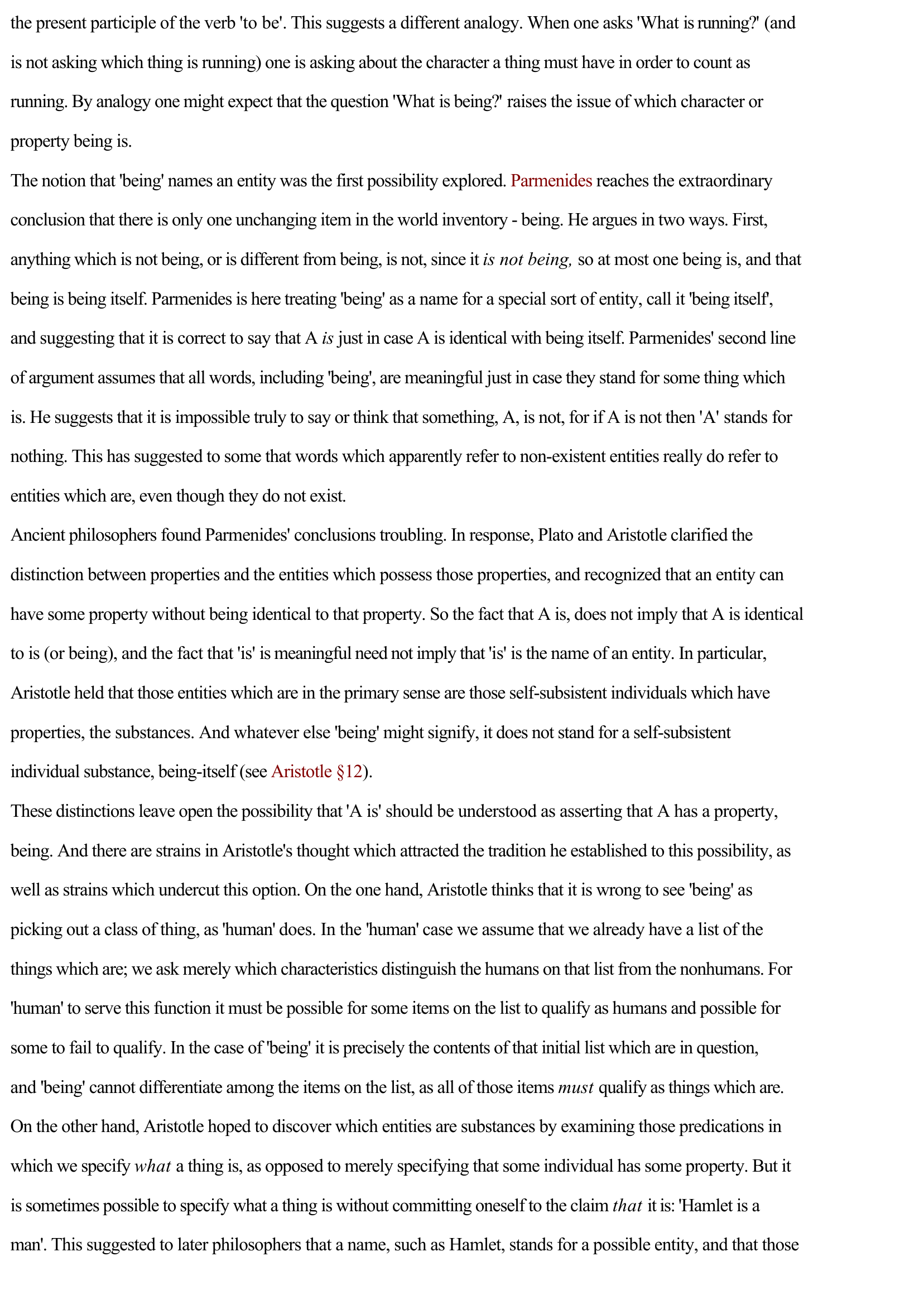Being
Publié le 22/02/2012

Extrait du document
«
the present participle of the verb 'to be' .
This suggests a different analogy.
When one asks 'What is running? ' (and
is not asking which thing is running) one is asking about the character a thing must have in order to count as
running.
By analogy one might expect that the question 'What is being? ' raises the issue of which character or
property being is.
The notion that 'being' names an entity was the first possibility explored.
Parmenides reaches the extraordinary
conclusion that there is only one unchanging item in the world inventory - being.
He argues in two ways.
First,
anything which is not being, or is different from being, is not, since it is not being, so at most one being is, and that
being is being itself.
Parmenides is here treating 'being' as a name for a special sort of entity, call it 'being itself' ,
and suggesting that it is correct to say that A is just in case A is identical with being itself.
Parmenides' second line
of argument assumes that all words, including 'being' , are meaningful just in case they stand for some thing which
is.
He suggests that it is impossible truly to say or think that something, A, is not, for if A is not then 'A' stands for
nothing.
This has suggested to some that words which apparently refer to non-existent entities really do refer to
entities which are, even though they do not exist.
Ancient philosophers found Parmenides' conclusions troubling.
In response, Plato and Aristotle clarified the
distinction between properties and the entities which possess those properties, and recognized that an entity can
have some property without being identical to that property.
So the fact that A is, does not imply that A is identical
to is (or being), and the fact that 'is' is meaningful need not imply that 'is' is the name of an entity.
In particular,
Aristotle held that those entities which are in the primary sense are those self-subsistent individuals which have
properties, the substances.
And whatever else 'being' might signify, it does not stand for a self-subsistent
individual substance, being-itself (see Aristotle §12 ).
These distinctions leave open the possibility that 'A is' should be understood as asserting that A has a property,
being.
And there are strains in Aristotle's thought which attracted the tradition he established to this possibility, as
well as strains which undercut this option.
On the one hand, Aristotle thinks that it is wrong to see 'being' as
picking out a class of thing, as 'human' does.
In the 'human' case we assume that we already have a list of the
things which are; we ask merely which characteristics distinguish the humans on that list from the nonhumans.
For
'human' to serve this function it must be possible for some items on the list to qualify as humans and possible for
some to fail to qualify.
In the case of 'being' it is precisely the contents of that initial list which are in question,
and 'being' cannot differentiate among the items on the list, as all of those items must qualify as things which are.
On the other hand, Aristotle hoped to discover which entities are substances by examining those predications in
which we specify what a thing is, as opposed to merely specifying that some individual has some property.
But it
is sometimes possible to specify what a thing is without committing oneself to the claim that it is: 'Hamlet is a
man' .
This suggested to later philosophers that a name, such as Hamlet, stands for a possible entity, and that those.
»
↓↓↓ APERÇU DU DOCUMENT ↓↓↓
Liens utiles
- Relationship between religion, spirituality, and young Lebanese university students’ well-being.
- Being Brown
- NOUS ÉTIONS DES GÉNIES [Being Geniuses Together]. (Résumé et analyse) Robert McAlmon
- Faustulus (Faustus) Roman The shepherd who found the twin infants Romulus and Remus being suckled by a wolf and took them to his home to give them shelter.
- Number Systems I INTRODUCTION Number Systems, in mathematics, various notational systems that have been or are being used to represent the abstract quantities called numbers.

































